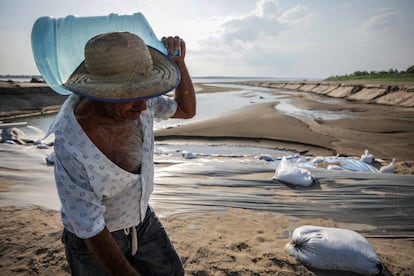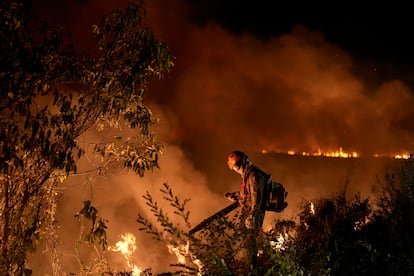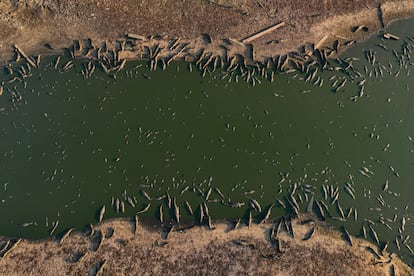‘A preview to hell’: The year Brazil woke up to the climate crisis
In 2023, the rivers of the Amazon dried up like never before, the temperatures in Rio reached 140 degrees and torrential rains left dozens dead in the south of the country

Last weekend, Brazil experienced its ninth heat wave of the year, with 15 states on alert due to high temperatures. These are the last blows of a year that’s on track to be the hottest in history.
In Brazil, since July, all average temperature records have been broken, month after month, according to the National Institute of Meteorology. The residents of Irajá – a neighborhood in the northern part of Rio de Janeiro – know this well. In recent years, the neighborhood has earned the reputation of being the hottest in the city. Here, less than 20 miles from the beaches of Ipanema and Copacabana, the sea breeze isn’t even noticeable, while trees are scarce. This district has nothing to do with the exuberant tropical city plastered all over the postcards for tourists.
On one corner, Giselle Silva sells sardines in boxes packed with ice. Every day, she slathers
herself in SPF-80 sunscreen, to work under an umbrella. Despite the shadow, she always ends up burned. “The most stressful thing is the heat: it’s unbearable. It’s gotten a lot worse in recent years. Let me tell you: this is a preview to hell. This summer is going to be terrible,” she says resignedly.
The residents of Irajá know very well that the scorching sun isn’t an isolated phenomenon. “For me, deforestation in the Amazon is the primary reason,” says Waldir Cavalcante, a taxi driver. He’s sitting on a plastic chair next to the door of an air-conditioned supermarket, to feel some relief. His taxi spends the day parked on the opposite sidewalk, in full sun. It doesn’t get even a little shade until four in the afternoon, the owner notes. He remembers a childhood in a very different neighborhood, with dirt roads and many more trees. Nowadays, Irajá is a sea of asphalt.

Heat waves in the cities, the extreme drought that has dried up the rivers of the Amazon, or the floods in the south of the country are all extreme climatic events that have been multiplied this year, as a result of El Niño. This phenomenon warms the environment naturally, but specialists warn that it’s increasingly intense due to climate change. For the director of the Climate and Society Institute (iCS), María Netto, the increase in the frequency and intensity of environmental catastrophes is something that has come to stay. But that’s not all. “There are impacts that aren’t so perceptible, that are growing little by little, such as the increase in temperature, or the variation in the frequency of rain, which [are factors that] have an enormous impact on agriculture and people’s quality of life. These impacts,” she continues, on the phone with EL PAÍS, “especially affect the most vulnerable people.”
In November – in the middle of the Southern Hemisphere’s spring – Brazil recorded the highest temperatures in its history. Due to the high humidity, a temperature of 140 degrees was recorded in Rio at eight in the morning. At the Taylor Swift concert held during the heatwave, a 23-year-old girl – Ana Clara Benevides – died of cardiac arrest. Inside the stadium, it was unbearably stuffy, while access to drinking water was limited. Following her death, the government reacted by quickly approving a decree that now forces event producers to offer free water on days with high temperatures. The pop star’s second concert was postponed for a day, because the heat didn’t let up.

Until recently, canceling a concert due to the heat sounded unreal to residents of Rio, who are accustomed to living with lots of sun. But lately, limits are being pushed. For the first time, the City Council has issued heat warnings, asking residents to avoid going outside.
With the widespread suffocation, air conditioner sales in Brazil have skyrocketed by 38%, while the prices of units have increased by 14%... the largest increase since 1994, according to the sector. But the increase in price isn’t explained only by rising demand: it has to do with what’s happening in the heart of the Amazon, where the worst drought in 121 years has drastically reduced the flow of the rivers. All air conditioners manufactured in Brazil leave from the Free Economic Zone of Manaus, the capital of the state of Amazonas. This industrial hub is only connected to the rest of the country via boat… and sailing is increasingly difficult and more expensive.
Beyond the manufacturing sector, the Indigenous people and the riverside communities that depend on the rivers of the Amazon for their subsistence are suffering. While rain began to ease the situation in recent weeks, at the peak of the drought, there were 62 municipalities on high alert, with 600,000 Brazilians requiring humanitarian aid to eat, take medication, or even access drinking water. The fires in the jungle, once again, submerged Manaus in an unbreathable cloud of smoke. The fire was also especially voracious with another valuable biome, the Pantanal, a wetland that burned like never before, because the rains took longer to arrive than other years.
If the residents of the Amazon – the region of the world with the most fresh water reserves – have to drink bottled water, in the extreme south of Brazil, the problem is one of excess. Since September, continuous storms have left a trail of destruction: at least 55 dead and thousands displaced. The Iguazú Falls reached the highest water level in nine years and the passage had to be closed to visitors. São Paulo – the country’s economic engine – wasn’t spared, either. In November, the state experienced a historic blackout. A storm with wind reaching more than 60 miles per hour left seven dead and toppled hundreds of trees, which damaged power lines. More than two million residences were without power for days.

As summer is set to begin in the Southern Hemisphere, in addition to the fear of heat, there’s a pervasive fear of the arrival of violent storms, which cause landslides and numerous fatalities every year. Another factor of concern is the small and dangerous Aedes Aegypti: the mosquito that transmits dengue, Zika and chikungunya. This year, dengue cases in Brazil increased by 15.8% compared to 2022, reaching 1.6 million. The Ministry of Health attributes this to the effects of El Niño having been inflated by climate change, which causes above-average rain and heat, in addition to the circulation of dengue type 3, which hasn’t been recorded in Brazil for 15 years. An explosion of cases is expected this summer. With the gradual increase in temperatures in recent years, this typically tropical disease has been advancing towards latitudes where it wasn’t as common before, such as the southern states of Brazil, which have a more temperate climate.
For María Netto at the Climate and Society Institute, the frequency and intensity of environmental tragedies could mark a before and after in Brazil, especially in terms of awareness at street level. Climate change is now in the neighborhood conversations, in the bus line, in the bakery. This awareness needs to be translated into action: it’s no longer just about reducing CO2 emissions, but also about containing immediate damage, because what Brazilians are experiencing – and what’s set to come – is already inevitable.
“I think there isn’t enough of a sense of urgency about how [crucial] an adaptation agenda is,” the specialist warns. “We’ve already done everything wrong. Now, we have to correct it.”

Sign up for our weekly newsletter to get more English-language news coverage from EL PAÍS USA Edition
Tu suscripción se está usando en otro dispositivo
¿Quieres añadir otro usuario a tu suscripción?
Si continúas leyendo en este dispositivo, no se podrá leer en el otro.
FlechaTu suscripción se está usando en otro dispositivo y solo puedes acceder a EL PAÍS desde un dispositivo a la vez.
Si quieres compartir tu cuenta, cambia tu suscripción a la modalidad Premium, así podrás añadir otro usuario. Cada uno accederá con su propia cuenta de email, lo que os permitirá personalizar vuestra experiencia en EL PAÍS.
¿Tienes una suscripción de empresa? Accede aquí para contratar más cuentas.
En el caso de no saber quién está usando tu cuenta, te recomendamos cambiar tu contraseña aquí.
Si decides continuar compartiendo tu cuenta, este mensaje se mostrará en tu dispositivo y en el de la otra persona que está usando tu cuenta de forma indefinida, afectando a tu experiencia de lectura. Puedes consultar aquí los términos y condiciones de la suscripción digital.








































